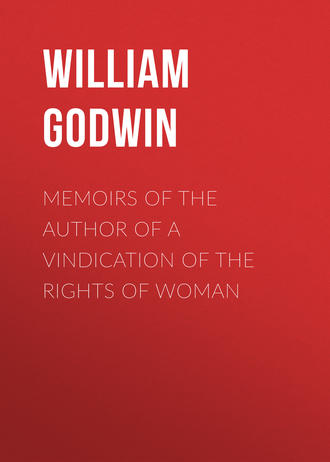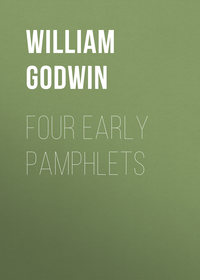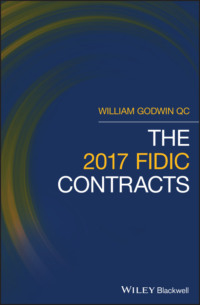 полная версия
полная версияMemoirs of the Author of a Vindication of the Rights of Woman
Another of the friends she acquired at this period, was Mrs. Burgh, widow of the author of the Political Disquisitions, a woman universally well spoken of for the warmth and purity of her benevolence. Mary, whenever she had occasion to allude to her, to the last period of her life, paid the tribute due to her virtues. The only remaining friend necessary to be enumerated in this place, is the rev. John Hewlet, now master of a boarding-school at Shacklewel near Hackney, whom I shall have occasion to mention hereafter.
I have already said that Fanny's health had been materially injured by her incessant labours for the maintenance of her family. She had also suffered a disappointment, which preyed upon her mind. To these different sources of ill health she became gradually a victim; and at length discovered all the symptoms of a pulmonary consumption. By the medical men that attended her, she was advised to try the effects of a southern climate; and, about the beginning of the year 1785, sailed for Lisbon.
The first feeling with which Mary had contemplated her friend, was a sentiment of inferiority and reverence; but that, from the operation of a ten years' acquaintance, was considerably changed. Fanny had originally been far before her in literary attainments; this disparity no longer existed. In whatever degree Mary might endeavour to free herself from the delusions of self-esteem, this period of observation upon her own mind and that of her friend, could not pass, without her perceiving that there were some essential characteristics of genius, which she possessed, and in which her friend was deficient. The principal of these was a firmness of mind, an unconquerable greatness of soul, by which, after a short internal struggle, she was accustomed to rise above difficulties and suffering. Whatever Mary undertook, she perhaps in all instances accomplished; and, to her lofty spirit, scarcely anything she desired, appeared hard to perform. Fanny, on the contrary, was a woman of a timid and irresolute nature, accustomed to yield to difficulties, and probably priding herself in this morbid softness of her temper. One instance that I have heard Mary relate of this sort, was, that, at a certain time, Fanny, dissatisfied with her domestic situation, expressed an earnest desire to have a home of her own. Mary, who felt nothing more pressing than to relieve the inconveniences of her friend, determined to accomplish this object for her. It cost her infinite exertions; but at length she was able to announce to Fanny that a house was prepared, and that she was on the spot to receive her. The answer which Fanny returned to the letter of her friend, consisted almost wholly of an enumeration of objections to the quitting her family, which she had not thought of before, but which now appeared to her of considerable weight.
The judgment which experience had taught Mary to form of the mind of her friend, determined her in the advice she gave, at the period to which I have brought down the story. Fanny was recommended to seek a softer climate, but she had no funds to defray the expence of such an undertaking. At this time Mr. Hugh Skeys of Dublin, but then resident in the kingdom of Portugal, paid his addresses to her. The state of her health Mary considered as such as scarcely to afford the shadow of a hope; it was not therefore a time at which it was most obvious to think of marriage. She conceived however that nothing should be omitted, which might alleviate, if it could not cure; and accordingly urged her speedy acceptance of the proposal. Fanny accordingly made the voyage to Lisbon; and the marriage took place on the twenty-fourth of February 1785.
The change of climate and situation was productive of little benefit; and the life of Fanny was only prolonged by a period of pregnancy, which soon declared itself. Mary, in the mean time, was impressed with the idea that her friend would die in this distant country; and, shocked with the recollection of her separation from the circle of her friends, determined to pass over to Lisbon to attend her. This resolution was treated by her acquaintance as in the utmost degree visionary; but she was not to be diverted from her point. She had not money to defray her expences: she must quit for a long time the school, the very existence of which probably depended upon her exertions.
No person was ever better formed for the business of education; if it be not a sort of absurdity to speak of a person as formed for an inferior object, who is in possession of talents, in the fullest degree adequate to something on a more important and comprehensive scale. Mary had a quickness of temper, not apt to take offence with inadvertencies, but which led her to imagine that she saw the mind of the person with whom she had any transaction, and to refer the principle of her approbation or displeasure to the cordiality or injustice of their sentiments. She was occasionally severe and imperious in her resentments; and, when she strongly disapproved, was apt to express her censure in terms that gave a very humiliating sensation to the person against whom it was directed. Her displeasure however never assumed its severest form, but when it was barbed by disappointment. Where she expected little, she was not very rigid in her censure of error.
But, to whatever the defects of her temper might amount, they were never exercised upon her inferiors in station or age. She scorned to make use of an ungenerous advantage, or to wound the defenceless. To her servants there never was a mistress more considerate or more kind. With children she was the mirror of patience. Perhaps, in all her extensive experience upon the subject of education, she never betrayed one symptom of irascibility. Her heart was the seat of every benevolent feeling; and accordingly, in all her intercourse with children, it was kindness and sympathy alone that prompted her conduct. Sympathy, when it mounts to a certain height, inevitably begets affection in the person towards whom it is exercised; and I have heard her say, that she never was concerned in the education of one child, who was not personally attached to her, and earnestly concerned, not to incur her displeasure. Another eminent advantage she possessed in the business of education, was that she was little troubled with scepticism and uncertainty. She saw, as it were by intuition, the path which her mind determined to pursue, and had a firm confidence in her own power to effect what she desired. Yet, with all this, she had scarcely a tincture of obstinacy. She carefully watched symptoms as they rose, and the success of her experiments; and governed herself accordingly. While I thus enumerate her more than maternal qualities, it is impossible not to feel a pang at the recollection of her orphan children!
Though her friends earnestly dissuaded her from the journey to Lisbon, she found among them a willingness facilitate the execution of her project, when it was once fixed. Mrs. Burgh in particular, supplied her with money, which however she always conceived came from Dr. Price. This loan, I have reason to believe, was faithfully repaid.
It was during her residence at Newington Green, that she was introduced to the acquaintance of Dr. Johnson, who was at that time considered as in some sort the father of English literature. The doctor treated her with particular kindness and attention, had a long conversation with her, and desired her to repeat her visit often. This she firmly purposed to do; but the news of his last illness, and then of his death, intervened to prevent her making a second visit.
Her residence in Lisbon was not long. She arrived but a short time before her friend was prematurely delivered, and the event was fatal to both mother and child. Frances Blood, hitherto the chosen object of Mary's attachment, died on the twenty-ninth of November 1785.
It is thus that she speaks of her in her Letters from Norway, written ten years after her decease. "When a warm heart has received strong impressions, they are not to be effaced. Emotions become sentiments; and the imagination renders even transient sensations permanent, by fondly retracing them. I cannot, without a thrill of delight, recollect views I have seen, which are not to be forgotten, nor looks I have felt in every nerve, which I shall never more meet. The grave has closed over a dear friend, the friend of my youth; still she is present with me, and I hear her soft voice warbling as I stray over the heath."
CHAP. IV.
1785-1787
No doubt the voyage to Lisbon tended considerably to enlarge the understanding of Mary. She was admitted into the best company the English factory afforded. She made many profound observations on the character of the natives, and the baleful effects of superstition. The obsequies of Fanny, which it was necessary to perform by stealth and in darkness, tended to invigorate these observations in her mind.
She sailed upon her voyage home about the twentieth of December. On this occasion a circumstance occurred, that deserves to be recorded. While they were on their passage, they fell in with a French vessel, in great distress, and in daily expectation of foundering at sea, at the same time that it was almost destitute of provisions. The Frenchman hailed them, and intreated the English captain, in consideration of his melancholy situation, to take him and his crew on board. The Englishman represented in reply, that his stock of provisions was by no means adequate to such an additional number of mouths, and absolutely refused compliance. Mary, shocked at his apparent insensibility, took up the cause of the sufferers, and threatened the captain to have him called to a severe account, when he arrived in England. She finally prevailed, and had the satisfaction to reflect, that the persons in question possibly owed their lives to her interposition.
When she arrived in England, she found that her school had suffered considerably in her absence. It can be little reproach to any one, to say that they were found incapable of supplying her place. She not only excelled in the management of the children, but had also the talent of being attentive and obliging to the parents, without degrading herself.
The period at which I am now arrived is important, as conducting to the first step of her literary carreer. Mr. Hewlet had frequently mentioned literature to Mary as a certain source of pecuniary produce, and had urged her to make trial of the truth of his judgment. At this time she was desirous of assisting the father and mother of Fanny in an object they had in view, the transporting themselves to Ireland; and, as usual, what she desired in a pecuniary view, she was ready to take on herself to effect. For this purpose she wrote a duodecimo pamphlet of one hundred and sixty pages, entitled, Thoughts on the Education of Daughters. Mr. Hewlet obtained from the bookseller, Mr. Johnson in St. Paul's Church Yard, ten guineas for the copy-right of this manuscript, which she immediately applied to the object for the sake of which the pamphlet was written.
Every thing urged Mary to put an end to the affair of the school. She was dissatisfied with the different appearance it presented upon her return, from the state in which she left it. Experience impressed upon her a rooted aversion to that sort of cohabitation with her sisters, which the project of the school imposed. Cohabitation is a point of delicate experiment, and is, in a majority of instances, pregnant with ill-humour and unhappiness. The activity and ardent spirit of adventure which characterized Mary, were not felt in an equal degree by her sisters, so that a disproportionate share of every burthen attendant upon the situation, fell to her lot. On the other hand, they could scarcely perhaps be perfectly easy, in observing the superior degree of deference and courtship, which her merit extorted from almost every one that knew her. Her kindness for them was not diminished, but she resolved that the mode of its exertion in future should be different, tending to their benefit, without intrenching upon her own liberty.
Thus circumstanced, a proposal was made her, such as, regarding only the situations through which she had lately passed, is usually termed advantageous. This was, to accept the office of governess to the daughters of lord viscount Kingsborough, eldest son to the earl of Kingston of the kingdom of Ireland. The terms held out to her were such as she determined to accept, at the same time resolving to retain the situation only for a short time. Independence was the object after which she thirsted, and she was fixed to try whether it might not be found in literary occupation. She was desirous however first to accumulate a small sum of money, which should enable her to consider at leisure the different literary engagements that might offer, and provide in some degree for the eventual deficiency of her earliest attempts.
The situation in the family of lord Kingsborough, was offered to her through the medium of the rev. Mr. Prior, at that time one of the under masters of Eton school. She spent some time at the house of this gentleman, immediately after her giving up the school at Newington Green. Here she had an opportunity of making an accurate observation upon the manners and conduct of that celebrated seminary, and the ideas she retained of it were by no means favourable. By all that she saw, she was confirmed in a very favourite opinion of her's, in behalf of day-schools, where, as she expressed it, "children have the opportunity of conversing with children, without interfering with domestic affections, the foundation of virtue."
Though her residence in the family of lord Kingsborough continued scarcely more than twelve months, she left behind her, with them and their connections, a very advantageous impression. The governesses the young ladies had hitherto had, were only a species of upper servants, controlled in every thing by the mother; Mary insisted upon the unbounded exercise of her own discretion. When the young ladies heard of their governess coming from England, they heard in imagination of a new enemy, and declared their resolution to guard themselves accordingly. Mary however speedily succeeded in gaining their confidence, and the friendship that soon grew up between her and Margaret King, now countess Mount Cashel, the eldest daughter, was in an uncommon degree cordial and affectionate. Mary always spoke of this young lady in terms of the truest applause, both in relation to the eminence of her intellectual powers, and the ingenuous amiableness of her disposition. Lady Kingsborough, from the best motives, had imposed upon her daughters a variety of prohibitions, both as to the books they should read, and in many other respects. These prohibitions had their usual effects; inordinate desire for the things forbidden, and clandestine indulgence. Mary immediately restored the children to their liberty, and undertook to govern them by their affections only. The consequence was, that their indulgences were moderate, and they were uneasy under any indulgence that had not the sanction of their governess. The salutary effects of the new system of education were speedily visible; and lady Kingsborough soon felt no other uneasiness, than lest the children should love their governess better than their mother.
Mary made many friends in Ireland, among the persons who visited lord Kingsborough's house, for she always appeared there with the air of an equal, and not of a dependent. I have heard her mention the ludicrous distress of a woman of quality, whose name I have forgotten, that, in a large company, singled out Mary, and entered into a long conversation with her. After the conversation was over, she enquired whom she had been talking with, and found, to her utter mortification and dismay, that it was Miss King's governess.
One of the persons among her Irish acquaintance, whom Mary was accustomed to speak of with the highest respect, was Mr. George Ogle, member of parliament for the county of Wexford. She held his talents in very high estimation; she was strongly prepossessed in favour of the goodness of his heart; and she always spoke of him as the most perfect gentleman she had ever known. She felt the regret of a disappointed friend, at the part he has lately taken in the politics of Ireland.
Lord Kingsborough's family passed the summer of the year 1787 at Bristol Hot-Wells, and had formed the project of proceeding from thence to the continent, a tour in which Mary purposed to accompany them. The plan however was ultimately given up, and Mary in consequence closed her connection with them, earlier than she otherwise had purposed to do.
At Bristol Hot-Wells she composed the little book which bears the title of Mary, a Fiction. A considerable part of this story consists, with certain modifications, of the incidents of her own friendship with Fanny. All the events that do not relate to that subject are fictitious.
This little work, if Mary had never produced any thing else, would serve, with persons of true taste and sensibility, to establish the eminence of her genius. The story is nothing. He that looks into the book only for incident, will probably lay it down with disgust. But the feelings are of the truest and most exquisite class; every circumstance is adorned with that species of imagination, which enlists itself under the banners of delicacy and sentiment. A work of sentiment, as it is called, is too often another name for a work of affectation. He that should imagine that the sentiments of this book are affected, would indeed be entitled to our profoundest commiseration.
CHAP. V.
1787-1790
Being now determined to enter upon her literary plan, Mary came immediately from Bristol to the metropolis. Her conduct under this circumstance was such as to do credit both to her own heart, and that of Mr. Johnson, her publisher, between whom and herself there now commenced an intimate friendship. She had seen him upon occasion of publishing her Thoughts on the Education of Daughters, and she addressed two or three letters to him during her residence in Ireland. Upon her arrival in London in August 1787, she went immediately to his house, and frankly explained to him her purpose, at the same time requesting his advice and assistance as to its execution. After a short conversation, Mr. Johnson invited her to make his house her home, till she should have suited herself with a fixed residence. She accordingly resided at this time two or three weeks under his roof. At the same period she paid a visit or two of similar duration to some friends, at no great distance from the metropolis.
At Michaelmas 1787, she entered upon a house in George street, on the Surry side of Black Friar's Bridge, which Mr. Johnson had provided for her during her excursion into the country. The three years immediately ensuing, may be said, in the ordinary acceptation of the term, to have been the most active period of her life. She brought with her to this habitation, the novel of Mary, which had not yet been sent to the press, and the commencement of a sort of oriental tale, entitled, the Cave of Fancy, which she thought proper afterwards to lay aside unfinished. I am told that at this period she appeared under great dejection of spirits, and filled with melancholy regret for the loss of her youthful friend. A period of two years had elapsed since the death of that friend; but it was possibly the composition of the fiction of Mary, that renewed her sorrows in their original force. Soon after entering upon her new habitation, she produced a little work, entitled, Original Stories from Real Life, intended for the use of children. At the commencement of her literary carreer, she is said to have conceived a vehement aversion to the being regarded, by her ordinary acquaintance, in the character of an author, and to have employed some precautions to prevent its occurrence.
The employment which the bookseller suggested to her, as the easiest and most certain source of pecuniary income, of course, was translation. With this view she improved herself in her French, with which she had previously but a slight acquaintance, and acquired the Italian and German languages. The greater part of her literary engagements at this time, were such as were presented to her by Mr. Johnson. She new-modelled and abridged a work, translated from the Dutch, entitled, Young Grandison: she began a translation from the French, of a book, called, the New Robinson; but in this undertaking, she was, I believe, anticipated by another translator: and she compiled a series of extracts in verse and prose, upon the model of Dr. Enfield's Speaker, which bears the title of the Female Reader; but which, from a cause not worth mentioning, has hitherto been printed with a different name in the title-page.
About the middle of the year 1788, Mr. Johnson instituted the Analytical Review, in which Mary took a considerable share. She also translated Necker on the Importance of Religious Opinions; made an abridgment of Lavater's Physiognomy, from the French, which has never been published; and compressed Salzmann's Elements of Morality, a German production, into a publication in three volumes duodecimo. The translation of Salzmann produced a correspondence between Mary and the author; and he afterwards repaid the obligation to her in kind, by a German translation of the Rights of Woman. Such were her principal literary occupations, from the autumn of 1787, to the autumn of 1790.
It perhaps deserves to be remarked that this sort of miscellaneous literary employment, seems, for the time at least, rather to damp and contract, than to enlarge and invigorate, the genius. The writer is accustomed to see his performances answer the mere mercantile purpose of the day, and confounded with those of persons to whom he is secretly conscious of a superiority. No neighbour mind serves as a mirror to reflect the generous confidence he felt within himself; and perhaps the man never yet existed, who could maintain his enthusiasm to its full vigour, in the midst of this kind of solitariness. He is touched with the torpedo of mediocrity. I believe that nothing which Mary produced during this period, is marked with those daring flights, which exhibit themselves in the little fiction she composed just before its commencement. Among effusions of a nobler cast, I find occasionally interspersed some of that homily-language, which, to speak from my own feelings, is calculated to damp the moral courage, it was intended to awaken. This is probably to be assigned to the causes above described.
I have already said that one of the purposes which Mary had conceived, a few years before, as necessary to give a relish to the otherwise insipid, or embittered, draught of human life, was usefulness. On this side, the period of her existence of which I am now treating, is more brilliant, than in a literary view. She determined to apply as great a part as possible of the produce of her present employments, to the assistance of her friends and of the distressed; and, for this purpose, laid down to herself rules of the most rigid economy. She began with endeavouring to promote the interest of her sisters. She conceived that there was no situation in which she could place them, at once so respectable and agreeable, as that of governess in private families. She determined therefore in the first place, to endeavour to qualify them for such an undertaking. Her younger sister she sent to Paris, where she remained near two years. The elder she placed in a school near London, first as a parlour-boarder, and afterwards as a teacher. Her brother James, who had already been at sea, she first took into her house, and next sent to Woolwich for instruction, to qualify him for a respectable situation in the royal navy, where he was shortly after made a lieutenant. Charles, who was her favourite brother, had been articled to the eldest, an attorney in the Minories; but, not being satisfied with his situation, she removed him; and in some time after, having first placed him with a farmer for instruction, she fitted him out for America, where his speculations, founded upon the basis she had provided, are said to have been extremely prosperous. The reason so much of this parental sort of care fell upon her, was, that her father had by this time considerably embarrassed his circumstances. His affairs having grown too complex for himself to disentangle, he had intrusted them to the management of a near relation; but Mary, not being satisfied with the conduct of the business, took them into her own hands. The exertions she made, and the struggle into which she entered however, in this instance, were ultimately fruitless. To the day of her death her father was almost wholly supported by funds which she supplied to him. In addition to her exertions for her own family, she took a young girl of about seven years of age under her protection and care, the niece of Mrs. John Hunter, and of the present Mrs. Skeys, for whose mother, then lately dead, she had entertained a sincere friendship.









